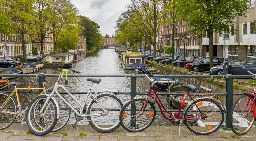Amsterdam to give car traffic less priority as streets and sidewalks fill up


nltimes.nl
Some interesting points:
That may mean that Amsterdam residents will have to “wait a little longer” during rush hour, motorists may spend longer at red lights, and locals may have to accept that same-day delivery is a thing of the past.
Cyclists will also have to adapt. Next year, the city will introduce streets where faster cyclists, often on e-bikes and fatbikes, can choose between the motorway or the bike path. Those who choose the bike path must adhere to a speed limit of 20 kilometers per hour.
For a city moving in the opposite direction: Change to the mobility law - Berlin CDU wants to abolish priority for cyclists
You are viewing a single comment
Why is Amsterdam so far ahead of anyone else regarding city planning
Don't forget that a few decades ago they were the same as everyone else, if not below average in terms of having a city designed for humans. It goes to show how effective consistent public policy is for changes like this.
They had a serious cultural moment as the result of a few dead kids that made safe transportation design a higher priority to speed/"reducing congestion". Similar to how backup cams were mandated for new vehicles in the US as a result of a few VERY tragic incidents.
This took a LOT of people who would otherwise be considered part of the car and driver constituency and moved them to a new vision zero constituency.
Everything else, at least at the start, flows from there. Once you commit to making your roads safe above all else, it rapidly becomes clear that car-first transportation design will simply never get you there. You need to roll safer alternatives to driving. And the more you do, the more the benefits compound. Building car-first transportation, as it turns out, is absurdly expensive compared to serious commitment to multi-modal design (the classic comparison is Amsterdam/NYC/Houston -- as a percent of the municipal budget, Houston is about double NYC and NYC is about double Amsterdam in terms of what they have to spend maintaining their transportation networks. Roads for cars are the most expensive form of transportation in spite of most other transit projects being judged as "too expensive").
There's some other very specific factors (e.g., the Nazis throwing all their bikes into the river during the occupation, creating a bit of patriotic imagery around a bike), but in my opinion the focus on vision zero is the main thing.
Unfortunately, it was lightning in a bottle. It's very unlikely you'll be able to copy that kind of cultural movement anywhere else. So in the rest of the world, it'll be up to dedicated, persistent, serious advocacy. I suggest you read/join Strong Towns, look up to see if you have a local bike/walk organization that does events, check if your city has a vision zero program, and above all else investigate your municipal planning commission (MPC) to see if they have public meetings -- showing up to an MPC meeting gives you a VASTLY outsized voice compared to anyone who doesn't, especially if you follow a good policy advocacy playbook to make persuasive arguments.
Japan's urban design is pretty excellent as well, for different reasons